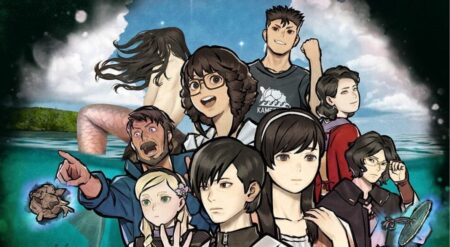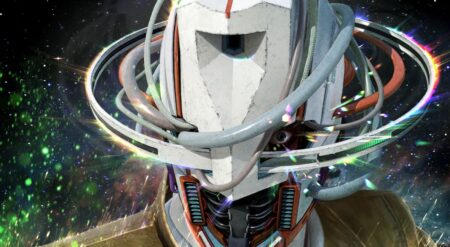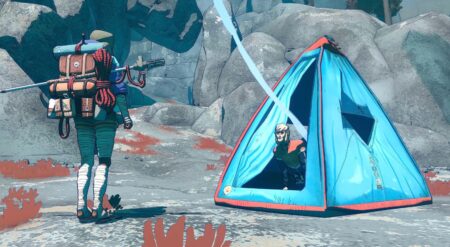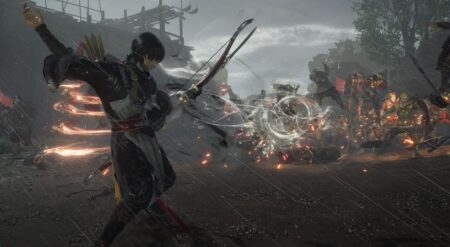Part of the human experience is to wonder how different your life could be. To think back on key moments and lament how much better things would be if you did take that job in another city or if you stood up to that childhood bully. Thanks to developer 11 bit studio’s self-published title, The Alters, we’re given the rare opportunity to see just how green the grass is on the other side.
The result is a surprisingly grounded look at all the ways a life can be shaped and how it affects a person and the world around them. It also results in one of the most unique survival adventure games that is sure to keep you thinking long after the credits roll.
When builder Jan Dolski becomes the sole survivor of a scientific voyage to another planet, he has to do whatever it takes to survive. At first, this simply means exploring the limited area around his ship and home base, a massive wheel with modular rooms making up the center of the structure. With enough resources and some vital tutorials, Jan is ready to get moving before the planet rotates him into the sun’s path, a lethal prospect on this hostile planet. Unfortunately, the final task he needs to complete is a two-person job, necessitating the primary conceit of The Alters.
Using the ship’s quantum computer and an artificial womb, Jan is forced to create a clone of himself. The catch is that this isn’t an exact copy of Jan; he needs a Jan with a different lifetime of memories and the skill set that comes with it to help him repair the ship and get it moving.
Not every clone will get along despite shared DNA and memories.

At this point, we’re given access to a timeline of Jan’s life, including some pivotal moments, like when he convinced his girlfriend to stay in the home they built together instead of uprooting their lives to support her career. Thanks to quantum shenanigans, we’re able to create a Jan who, instead of running away to college, leaving his mother in the care of his abusive father, chose to confront his father, making him more assertive in life.
Once we create that split, we can see how much better Jan II’s life is, at least at first. Despite his newfound assertiveness, life isn’t all sunshine and rainbows for this version of our protagonist. It does, however, lead him to a job at a garage working with machines, which is precisely what’s needed for the situation at hand. Even this job presents some challenges for Jan Technician, as he comes to be known, making him more cynical and, at times, abrasive.
This leads to one of the most memorable aspects of The Alters. As your crew grows to include more than half a dozen versions of Jan, you’ll quickly learn that having the DNA and childhood memories does not ensure that you’ll get along with every alternate version of yourself.
Sure, it can be nice to reminisce about your mother’s pierogis, but such a shallow attempt to connect with your alters can backfire if one of them thinks you’re being manipulative. The harder you try to connect or keep the peace, the more your Alters can rebel, trying to assert themselves as real when their memories come from a lifetime that doesn’t actually exist.
At its heart, The Alters is a game of survival.

It’s not all bad though. There are plenty of introspective moments to be had with your Alters, opportunities for the original Jan to learn and grow. You don’t always have to do what people ask of you, and it’s okay to be vulnerable and honest about your feelings, especially when you’re stranded on a planet an unfathomable distance from Earth. These are a few of the lessons your Alters can impart, but you don’t have to be mining for rare resources on an alien planet to learn from them.
As the leader of the bunch, Jan will be required to make decisions that affect everyone’s wellbeing. You have access to a long-distance communication device, but do you use it to ask your ex-girlfriend for help, or are you too stubborn to let her in? Even if you do ask for help, do you let her know about your growing crew of Jans, or do you keep them under wraps for fear of how she’ll react?
These and many other choices affect how your quest will unfold and how your Alters think of you, and it turns every decision into a multifaceted puzzle. The Alters is gracious enough to keep track of your decision, so if you decide to reload a day, your previous answers will be highlighted, allowing you to take the path not traveled on your second trip.
These decisions and the social aspects are just one key component in The Alters, but they don’t make up the entirety of the gameplay. At its heart, The Alters is a survival game. This means players will venture out as Jan to map out your surroundings and find resources to mine, turning them into equipment, new rooms in your base, or converting them into food so your crew doesn’t starve.
Don’t expect traditional combat in the world of The Alters.

Exploration feels like a puzzle on its own, with various obstacles strewn throughout the environments to slow you down. Still, the game succeeds in making your exploration feel important, even outside of finding new resource fields.
One key piece of equipment is your pylons, a series of lamppost-like structures that connect your base to mining rigs or travel posts you’ve established. As you explore, you can drop pylons, establishing a travel beacon once you reach a natural stopping point. Whether you run out of resources, energy, or need to return to base before you receive a radiation burn, your expeditions don’t feel wasted when you can set down a beacon and continue the next day. Eventually, your environments will begin to twist and coil around themselves, especially allowing spacial thinkers to circumvent hazards with cleverly placed pylons.
The Alters doesn’t feature combat in the traditional sense – you won’t be gunning down hordes of alien creatures hellbent on keeping you stranded. Instead, Jan will be haunted and impeded by a series of anomalies, some of which can deliver immense doses of radiation. Since your weapon of choice, a special flashlight also runs on your spacesuit’s energy, these anomalies become yet another obstacle to slow down your exploration. There are ways to make your life and the lives of your Alters easier, though, and it rests solely on the shoulders of Jan Scientist.
Each Alter has a hand in keeping the world within the game running.

As a man who gave up on personal relationships to focus on the pursuit of knowledge, Jan Scientist is naturally the one to push the boundaries of knowledge on your semi-doomed expedition. With his help you’ll be able to research upgrades, making your life much easier.
Some of these upgrades feel like small steps that add up, but some of the best upgrades are game changers, giving Jan access to better equipment and tools and even giving your Alters new rooms, allowing the whole crew to unwind with a movie night or a gym. As you explore the world, you can even find movies to play in your social room, and they’re all surprisingly engaging short films you can watch in their entirety.
However, as the only Jan smart enough to work in the Research Lab, Jan Scientist becomes a bottleneck for your adventure. No other version of Jan is solely responsible for such a vital task, making it feel like a waste whenever he isn’t being used to research further upgrades. There are plenty of other chances to manage your crew and time, so this doesn’t ruin the experience, but it’s a unique annoyance.
As mentioned, you’ll be managing your crew and their time, making up the third significant aspect of the game. While Jan is out exploring, crafting, or utilizing a mining rig to extract resources, you can assign each Alter to various tasks. These include crafting food in the kitchen, using a mining rig in the field, resting in the infirmary, working on maintaining the base, and more. Though you’re not prompted to make more than the first few Alters, it quickly becomes tempting to produce more, giving you more hands to keep things running.
Your ability to problem solve is key.

This management role requires you to maintain balance, creating enough food daily while harvesting enough resources to produce all the things you’ll need to survive. You can pull your researcher away from his work to help with other vital tasks, but that slows down your research. Still, though, when things get desperate, you’ll need all hands on deck. Things never quite felt dire in my time with The Alters, but there are a few difficulty options you can adjust if you want more or less of a challenge.
When it comes to survival games, I think of open-world, open-ended games that allow you to simply exist for as long as you want. The Alters is not that; it presents a problem, and it gives you a light time limit to solve that problem. The narrative, at its core, supports every aspect of the game, from the survival and gathering elements to the social side, and especially the management feature.
The Alters forces Jan and players to make decisions that may emotionally harm one or more of their Alters but it never makes light of these instances, and it certainly never insinuates that your Alters are lesser than simply because you’re the original Jan. It presents a story worth experiencing that insists that every side of the fence has some green, but it also has hardships and sacrifice, and that those can only be learned from if you stop looking back.
Instead, it pushes us to look ahead and make the best of what we’ve got instead of wasting a lifetime thinking of what we could have done differently. The Alters teaches us that along the non-stop race for survival, sometimes you need to relax with a movie night with the people who know you best.
The Alters releases June 13, 2025 on PC, PlayStation 5 and Xbox Series X|S
The Alters
-
Rating - 9/109/10
TL;DR
The Alters teaches us that along the non-stop race for survival, sometimes you need to relax with a movie night with the people who know you best.







